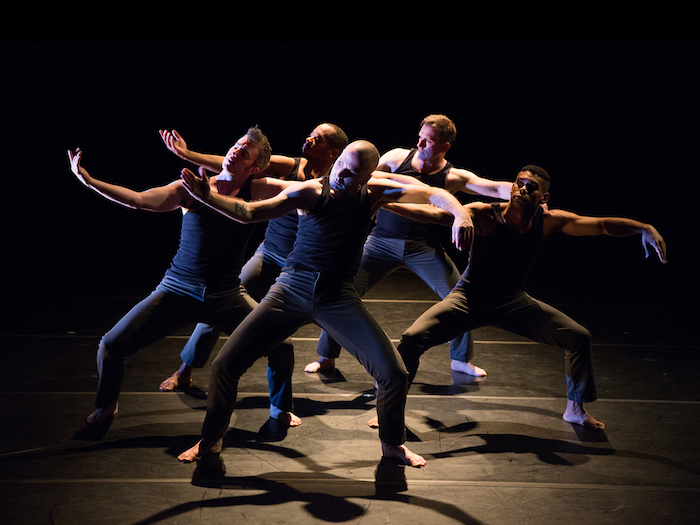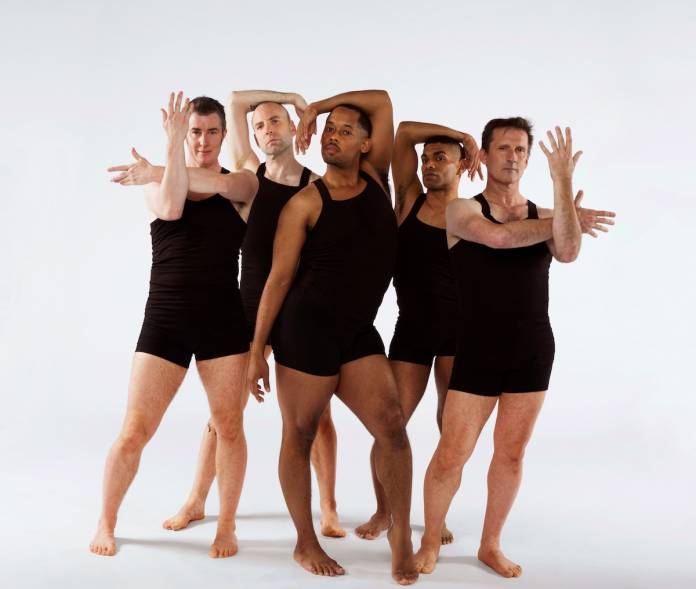DANCE Alt-right, #metoo, the Trump administration: Toxic masculinity and its effects are all the rage. We live in a culture that only allows (and rewards) men to feel anger, aggressiveness, competitiveness, and other narrowly defined traits. And we’re just waking up to the harm that this has caused. Even the trans and queer communities are affected from within by society’s corrosive standards of what it means to be “a real man.”
Essential local dance company Sean Dorsey Dance continues to address hot button topics from a place of diversity and passion, queering our view of binary constructs while presenting forceful and moving works. Its latest, Boys in Trouble (Thu/19-Sat/21 at Z Space), takes on toxic masculinity in all its insidious forms.
The piece was developed after Dorsey traveled the country for two years, hosting community forums, teaching free movement workshops for and recording interviews with transgender, gender-non-conforming, cisgender, gay, bi, and queer people on the masculine spectrum. But it’s hardly a grim essay on the state of gender in the US. Instead, it plays against such expectations to make a statement about vulnerability and celebrate resilience, with humor and healing.
“The show is a fusion of full-throttle dancing (and I do mean full-throttle: We soak through 12 costume changes!), bold theater, intimate storytelling, and gorgeous partnering,” Dorsey told me over email. “How often do we get to see masculine bodies touching each other with tenderness and care? The dancing is pretty spectacular—we’re proud of the work. The storytelling comes from the performers, as well as from the communities we worked with. And I guarantee audiences will both laugh out loud (a lot) and will definitely tear up.”
I conversed with Dorsey over email about masculinity, vulnerability, and the expansive possibilities of being “proud, sassy, loud, and fierce.”
48 HILLS The process for creating Boys in Trouble was incredibly involved—and involving. You traveled around the country for two years hosting forums on masculinity and teaching movement classes to queer and trans people all along the masculinity spectrum. What was the genesis of that, and can you share a couple of anecdotes from the road?
SEAN DORSEY As a choreographer, I’m passionate about creating dances that are deeply human, widely accessible, moving and super relatable for my audiences. Modern dance has a reputation for being cryptic, inaccessible and irrelevant. That’s not what I do. I choose themes that will speak to people on a deep level, and I also choose make my work in community: I talk with people, listen to people, host workshops that give people creative skills and a voice.
So to create Boys in Trouble, I had the amazing opportunity to work with people in several cities across the US (from Maui to San Francisco to small-town Maine). Two things really stood out to me from that process: the first, that people living within the constraints of masculinity—whether in small towns or big cities—are profoundly harmed by the structures, demands, expectations and violence of toxic masculinity. The second thing was how extraordinarily resilient, smart, loving, warm, strong, brave, and creative queer and trans communities are. I was so inspired again and again!
I’m really excited that Boys in Trouble will be touring to 20 cities across the US after our San Francisco premiere; and in each city, we hold a week-long residency with free community forums, trans-supportive dance workshops, and more.
48H What perspective did you gain in your travels on these phenomena, and what of that coming through in the dances you’ve created? I’m especially fascinated by how you’re seeing this through a trans and queer lens.
SD Our culture constantly tells trans people that we are “less than,” incomplete, and flawed. Boys in Trouble asserts that in fact, trans people are whole, deeply conscious, insightful, strong people who have a TON of insight to offer to the broader culture around gender, well-being and healing. Trans people have to work so fucking hard to stay alive and thrive in a world that hates us and harms our bodies; we’ve navigated multiple genders and gender expression… so we have a lot to teach, share and provide leadership and insight around.
In this work, we explore white fragility, masculine rage and fragility and violence, expectations of trans masculinity. But we also explore the glorious, creative, brilliant, expansive possibilities of queer and trans gender-fluid and masculine gender expression. We’re proud, sassy, loud, and fierce… and then we also get super vulnerable, allow our own masks to come off to reveal our own sources of shame and trauma.

48H You mention vulnerability. What was your experience of that in the communities you visited, and how does that come through in the dances?
SD Here’s the thing: the gender binary is (literally) man-made, and it’s harmful to everyone: cisgender, trans, hetero, queer, nonbinary… We inflict violence on ourselves and each other as we constantly scramble to “measure up.” That applies to masculinity, femininity … and it also applies to the pressure of being “queer” enough, or being “trans” enough or the “acceptable/passable” kind of transgender. We have one super sassy section that asks, Is THIS butch enough for you?
What’s underneath all of this—for everyone—is shame. We learn shame as we learn how to “do” our gender correctly. And shame lives in the body, so unpacking that shame through dance is visceral, powerful and healing.
48H The diversity of your company always awes me, can you tell me a little about collaborating and working with the dancers for this project?
SD I love my company, we’re truly like family. There are five of us, and we are trans (me) and cisgender; white and Black; queer, gay, and bi; and our ages span three generations. Boys in Trouble is performed by myself, Brian Fisher, ArVejon Jones, Nol Simonse and Will Woodward.
I’m not interested in dance companies that feature under-fed binary-gendered all-cisgender dancers who are directed to put on blank stares, perform only-hetero partnering and narratives, and emotionally remove themselves from the work. I’m interested in real human experience; I’m interested in deeply, deeply moving my audiences and transforming them; I’m passionate about cracking open our wounded hearts to heal; I’m passionate about connecting queer and trans audiences to joy and beauty, and lifting up ourselves as strong and beautiful.
BOYS IN TROUBLE
Thu/19-Sat/21
Z Space, SF.
Tickets and more info here.








